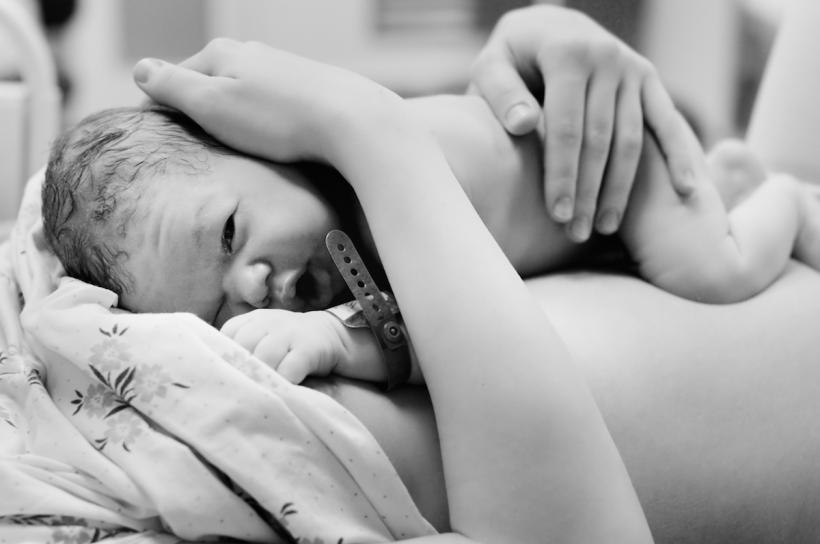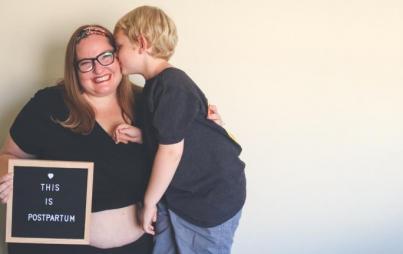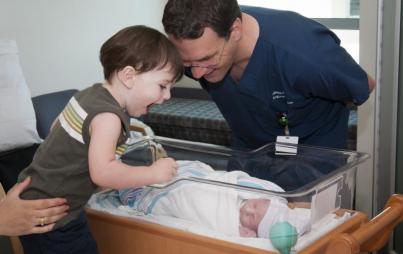
In childbirth, choice is a luxury. There is no “should” — only what is.
This article first appeared on Role Reboot and has been republished with permission.
When I found out I was pregnant I immediately started making my birth plan.
I planned on giving birth in a hospital, but I wanted to do it without any medical intervention, so I switched from my OB to a team of midwives. I wanted to use the birth ball, the birth stool, and the birthing tub. My husband and I took a 12-week natural birth class that focused on nutrition, daily relaxation exercises, and thousands of Kegels.
In my natural birth class, they told us about the dangers of epidurals. They had one of the expectant fathers sit in a chair, taped an IV line to his arm, and attached a pretend catheter to his leg. Then they showed us the epidural itself; a long, thin, sharp needle that would be inserted into our backs while we were having contractions. They explained that we would have to keep absolutely still while it was being inserted — a slip of the needle and we could be paralyzed.
The father sat there, covered in lines and tubes. “Does that look natural?” the teacher asked. Then she told us that babies who are exposed to epidurals are born blue and don’t cry right away. “Is it worth the risk?” she asked.
I knew several women who had successfully given birth without pain medication, including my mother, who did it three times. My father always spoke of watching my mother give birth to their children with such pride. “Your mom is a tough cookie,” he would say. I asked my mom how she did it, if it was really that bad. “It’s that bad, honey. It’s the worst pain of your life. Back then, though, they basically knocked you out. There wasn’t any numbing from the waist-down. If there had been, I probably would have gotten it. I’ll be honest.”
I wanted to find a way to be like my mom, to give birth without any interventions or drugs. I became addicted to reading natural birth stories on online. I watched a YouTube video of an Australian woman giving birth in a creek and marveled at her fortitude. I thought, “It’s a choice. I can do this. I just have to decide to do it.”
I started asking other mothers I knew for their birth stories. Most of them involved an initial commitment to giving birth without intervention, followed by a birth that either required intervention or led them to call for an epidural after enduring horrible contractions. A friend who had a home birth told me, “There was a moment where, if I could have gotten an epidural, I absolutely would have.”
I told a male friend over lunch that I was committed to natural childbirth. He told me his wife had gotten an epidural for each of their children and that everything had turned out fine. “But I don’t want one,” I professed. “You say that now,” he responded, “but when the pain starts…just keep an open mind.”
But I didn’t want an open mind. I wanted to give birth the right way, the proper way, the way women had been giving birth for millennia.
I wanted to walk around during labor, maybe sit in a birthing tub, use a ball, breathe deeply, meditate, really feel my body going through this miraculous process of opening up and letting a new life into the world.
At night, I confessed to my husband that I was worried I wasn’t going to be able to tough it out. He stroked my back and told me time and again that it doesn’t matter, that a healthy baby is the goal, and that he would support me no matter what I decided. We made up a safe word, so I could talk about an epidural during labor without actually meaning it. That safe word, the word that meant I truly needed an epidural, was “horchata.”
At 41 weeks, I was still pregnant. While I was getting antsy to deliver my baby, I was still committed to going into labor naturally. I ate spicy food, went for long walks, and waited. At 41-1/2 weeks I went to my midwives for my weekly appointment. They performed a standard ultrasound and found that my amniotic fluid levels were incredibly low. This indicated that my placenta had reached the end of its life and was beginning to break down. The midwife looked at me and said, excitedly, “We’re going to induce you. You’re having a baby today!”
I don’t believe that we can control the type of birth that we have. Giving birth without medical intervention is entirely possible in many cases, but the fetishization of natural childbirth creates a destructive illusion of control.
I knew that induction meant I was more likely to end up with an epidural. I knew it meant I’d get an IV line with a pole that would limit my movement. I knew they’d give me Pitocin, which would cause intense contractions I wasn’t sure I could withstand. I started to cry, “No. I’m going to have a natural childbirth. I don’t want to be induced.” The midwife patted my hand as she said, “I know. I know.” I relaxed a bit and she continued. “The good news is, today’s your baby’s birthday!”
I went to the hospital, got into a gown, and got an IV line put in. Then the induction process began. I could feel the contractions coming, the slow increase of pressure building up to pain, pain, pain, then decreasing, falling away to nothing. I was able to relax into these contractions, breathe through them, think of them as a tool that was getting me closer to meeting my baby.
Then they started me on Pitocin, and the contractions changed. There was no warning, no gentle increase of pressure, just sudden stabbing pain, followed by incredible pain, followed by a pain that obliterated all of my other senses until I was just a small, pulsing ball of pure, radiating pain. And then the contraction ended, and I could think and see and speak again. And then, without warning, the pain would return. My mom stood over me, rubbing my back, encouraging me to “relax, breathe, relax,” but I couldn’t. My body was a muscle fully contracted. I couldn’t anticipate the pain so I couldn’t ease into it. It consumed me.
After an hour of this I asked the labor nurse for a birthing ball. I thought, maybe if I could get out of bed and sit up the pain wouldn’t rock me so. She left, and more shattering contractions followed. Another nurse came into the room and I said, “I asked for a birth ball, but I meant an epidural. Give me an epidural.” My husband said, “Honey, are you sure?” I responded, “HORCHATA.”
The epidural was like a miracle.
Take the worst pain you’ve ever felt. Double, triple, quadruple it. Reset your entire pain scale so that instead of 1-10 it now goes 1-1,000. And then stop it completely. Replace it with a gentle tickling sensation. The epidural took the pain away and, as my body continued to labor, I took a nap.
Three hours after I received the epidural, my son was born, pink and screaming. A week later, my natural birth class teacher checked in with me via email. She wanted to know how my labor had gone and if I’d had natural childbirth. The other women in my class had gotten C-sections, so the teacher was hoping I could provide a natural childbirth testimonial for her upcoming class. I responded that I was induced and had received an epidural.
“If you get pregnant again I’d really emphasize nutrition. Get plenty of protein and increase your calories with plenty of nutritious food,” was her response.
It requires magical thinking to believe more protein would have “saved” me from induced labor.
And actually, my labor was lovely. What began with excruciating pain ended with me being able to focus on painlessly pushing my son into the world.
I don’t believe that we can control the type of birth that we have. Giving birth without medical intervention is entirely possible in many cases, but the fetishization of natural childbirth creates a destructive illusion of control. We are already so hard on women, and women are so hard on themselves. We shouldn’t set them up to feel like any birth that ends in a healthy child is a failure.
It’s not enough to get pregnant and carry a baby for nine months and produce a healthy child — you have to do it the “right” way. And, for women, the “right” way is usually the way that causes you the most physical pain.
The moment a child arrives is a moment where multiple people are born: the child, the mother, the father, the grandparents, the aunts and uncles. A new life is coming and it does not care about your birth plans or how its birth should be.
In childbirth, choice is a luxury.
There is no “should” — only what is.
More from Role Reboot:






![By Ricky Wilson [CC BY-SA 4.0 (https://creativecommons.org/licenses/by-sa/4.0)], via Wikimedia Commons By Ricky Wilson [CC BY-SA 4.0 (https://creativecommons.org/licenses/by-sa/4.0)], via Wikimedia Commons](/sites/default/files/styles/profile/public/images/article/2019-06/2048px-Catherine_Elizabeth_Middleton_%2528colorized%2529.jpg?itok=0NHwx53l)

